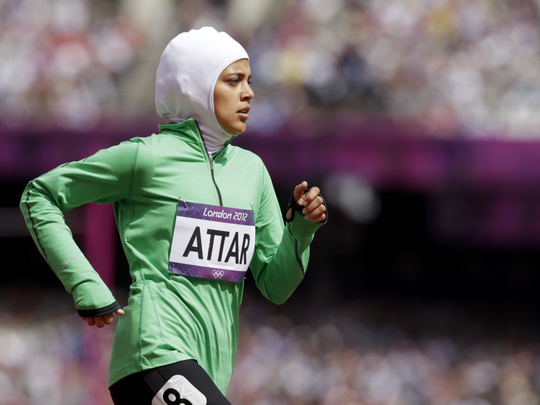
The 2016 Summer Olympics, generally known as Rio 2016, is due to start in a few days from now in Rio de Janeiro, Brazil. In the wake of the upcoming event, the Saudi Olympics Executive Director, Hussam Al Qurashi, touched upon the women’s sports scene in the Kingdom, saying that their sports will be allowed in accordance with Sharia.
It should be recollected that the participation of the Saudi all-male contingent to the 2012 Summer Olympics in London was threatened because Saudi Arabia had not nominated a single female athlete to represent the country. It was only after some back-room wrangling that two Saudi female athletes were added to the team and only then Saudi Arabia’s participation was given the nod.
Now Al Qurashi says: “Women have the right to exercise and participate in sports, because a healthy mother raises healthy children. But the Saudi Olympic Committee will not do anything against the decorum of Saudi society and the instructions of the Council of Senior Scholars. The committee believes in the principles of Sharia.” In a general appeasement of sorts, Al Qurashi added, “We support women’s sports, as instructed by our Islamic teachings. We will not hold a sporting event for women without proper licensing and without ensuring that the event conforms to the teachings of the Quran.”
Stating that there is an Islamic committee monitoring the decisions of the Saudi Olympic Committee to ensure that it follows Islamic teachings, Al Qurashi emphasised, “We will be monitoring all women’s sports events to ensure that they follow Islamic principles. We are looking into allowing sports events for women. We had women participate in the Olympics, but they adhered to Islamic regulations.”
In response to a query on having sports clubs in the Kingdom where women could participate competitively, Al Qurashi admitted that there were no women’s sports clubs for competitive purposes at the moment in Saudi Arabia.
For the Rio Olympics, and without much fanfare, the Saudi Olympic Committee has allowed four Saudi female athletes to take part. They were all given wild-card entries to facilitate their participation, without having to go through the rigours of the formal qualification procedures. One of them, Sara Attar, has been to the Olympics before. The other three female athletes are new to this sporting extravaganza. Without any experience of competitive sports, not much hope is pinned on these athletes, though. However, their participation in itself is a victory of sorts for many.
I fail to understand, however, why one has to always drag the Sharia whenever an issue concerning women is discussed. Be it driving, owning a business, managing a company, introducing physical education in schools ... someone always has to cite Sharia or bring social and traditional norms into the equation. It makes me wonder if Saudi females are in any way different from Muslim female athletes in other parts of the world. Isn’t Sharia a universal set of codes that governs the religion or do we have some privileges that others are not entitled to? And just who determines what the social or traditional standards of society are?
Saudi Arabia is made up of rural and urban areas and there is great diversity among its people in terms of habits and norms. It will be very difficult to categorically state that there is one social tradition or norm that is palatable to the whole country. Yes, Saudis do follow the same religion and the tenets of Sharia, but Sharia is often the victim of differing interpretations. Some take a very narrow view of what is and what isn’t allowed, while others are far more tolerant.
Every region has its own set of standards. The cities are more cosmopolitan and by nature have a more open-minded view on many issues, including those that pertain to women. In villages and towns, the situation may be far different. But whatever the case may be, the participation of women in global sporting events such as the Olympics should not be held hostage to a narrow interpretation of rules and norms.
As Al Qurashi rightly said that healthy mothers are more prone to raise healthy children, then we should consider that in an era where diabetes and other sicknesses are rising among people. A healthy activity, such as competitive sports, will go a long way in staving off future ailments.
The health of a nation is determined by the health of its people and the encouragement for women to participate respectably in sports. And that is certain to result in a healthy society.
Tariq A. Al Maeena is a Saudi sociopolitical commentator. He lives in Jeddah, Saudi Arabia. You can follow him on Twitter at www.twitter.com/@talmaeena Twitter.











